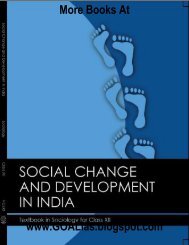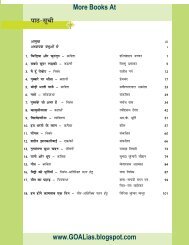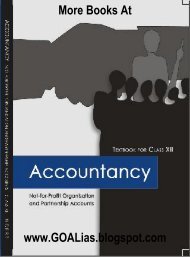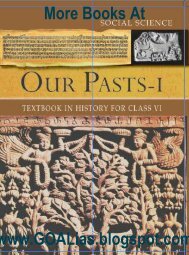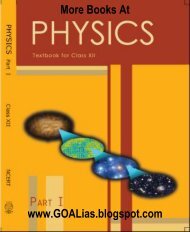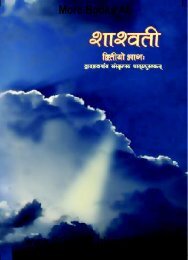t.com www.GOALias.blogspot.com www.GOALias.blogspot.com
t.com www.GOALias.blogspot.com www.GOALias.blogspot.com
t.com www.GOALias.blogspot.com www.GOALias.blogspot.com
- No tags were found...
Create successful ePaper yourself
Turn your PDF publications into a flip-book with our unique Google optimized e-Paper software.
<strong>www</strong>.<strong>GOALias</strong>.<strong>blogspot</strong>.<strong>com</strong>88 Politics in India since Independence“...in India, aspresent trends continue…maintenance of an orderedstructure of society is goingto slip out of reach of anordered structure of civilgovernment and the armywill be only alternativesource of authorityand order. …the greatexperiment of developingIndia within a democraticframework has failed.“Neville Maxwell‘India’s DisintegratingDemocracy’ an articlepublished in the LondonTimes, 1967.government. Parties opposed tothe Congress realised that thedivision of their votes kept theCongress in power. Thus partiesthat were entirely different anddisparate in their programmesand ideology got together toform anti-Congress fronts insome states and entered intoelectoral adjustments of sharingseats in others. They felt that theinexperience of Indira Gandhiand the internal factionalismwithin the Congress providedthem an opportunity to topplethe Congress. The socialistleader Ram Manohar Lohiagave this strategy the nameof ‘non-Congressism’. He alsoproduced a theoretical argumentin its defense: Congress rule wasundemocratic and opposed to theinterests of ordinary poor people;therefore the <strong>com</strong>ing togetherof the non-Congress partieswas necessary for reclaimingdemocracy for the people.C. Natarajan Annadurai(1909-1969): Chief Ministerof Madras (Tamil Nadu)from 1967; a journalist,popular writer and orator;initially associated with theJustice Party in Madrasprovince; later joined DravidKazagham (1934); formedDMK as a political party in1949; a proponent of Dravidculture, he was opposed toimposition of Hindi and ledthe anti-Hindi agitations;supporter of greaterautonomy to States.RammanoharLohia (1910-1967):Socialist leader andthinker; freedomfighter and amongthe founders of theCongress SocialistParty; after thesplit in the parentparty, the leader of the Socialist Partyand later the Samyukta SocialistParty; Member, Lok Sabha, 1963-67; founder editor of Mankind andJan, known for original contributionto a non-European socialist theory;as political leader, best known forsharp attacks on Nehru, strategyof non-Congressism, advocacy ofreservation for backward castes andopposition to English.Electoral verdictIt was in this context of heightened populardiscontent and the polarisation of political forcesthat the fourth general elections to the Lok Sabhaand State Assemblies were held in February 1967.The Congress was facing the electorate for the firsttime without Nehru.The results jolted the Congress at both thenational and state levels. Many contemporarypolitical observers described the election results asa ‘political earthquake’.The Congress did manageto get a majority in the Lok Sabha, but with itslowest tally of seats and share of votes since 1952.Half the ministers in Indira Gandhi’s cabinet weredefeated. The political stalwarts who lost in theirconstituencies included Kamaraj in Tamil Nadu,S.K. Patil in Maharashtra, Atulya Ghosh in WestBengal and K. B. Sahay in Bihar.





